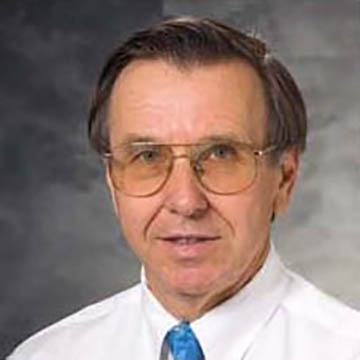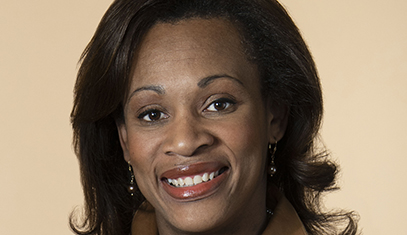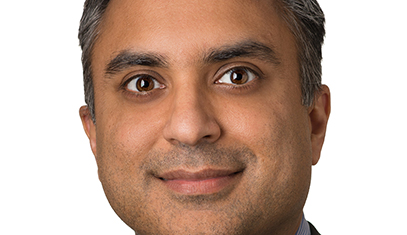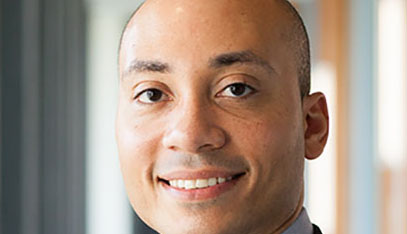A Decade of Mentorship: Fleming’s Leadership at NUCATS Punctuated by National Impact
Carnethon, Kalhan to co-direct Education and Career Development Center; McColley to direct TL1 scholar program
“The ability to be a great mentor is not something you’re born with,” says Michael Fleming, MD, MPH. “It is, however, something that can be nurtured — through formal and informal education — to grow alongside one’s career.”
Fleming, vice chair for Faculty Development in the Department of Psychiatry and Behavioral Sciences and professor of Psychiatry and Behavioral Sciences and Family and Community Medicine, recently ended a 10-year tenure as director of the Northwestern University Clinical and Translational Sciences Institute’s Center for Education and Career Development (CECD).
“This has been an amazing journey, and I’m extremely proud that our team has provided mentor training to more than 600 Northwestern University Feinberg School of Medicine faculty members,” says Fleming. “When I started at NUCATS in 2010, our TL1, KL2 and MSCI programs were still in their infancy. Today, they provide robust opportunities for career growth and are among 15 major programs that I’ve helped develop and support over the years.”
NUCATS Institute members Mercedes Carnethon, PhD, Vice Chair of the Department of Preventive Medicine and the Mary Harris Thompson Professor of Preventive Medicine (Epidemiology) and Medicine (Pulmonary and Critical Care), and Ravi Kalhan, MD, MS, Professor of Medicine (Pulmonary and Critical Care) and Preventive Medicine (Epidemiology), have been named co-directors of the CECD, effective June 1.

This has been an amazing journey, and I’m extremely proud that our team has provided mentor training to more than 600 faculty members. When I started at NUCATS in 2010, our TL1, KL2 and MSCI programs were still in their infancy. Today, they provide robust opportunities for career growth and are among 15 major programs that I’ve helped develop and support over the years.”
Michael Fleming, MD, MPH
Vice chair for Faculty Development in the Department of Psychiatry and Behavioral Sciences, Professor of Psychiatry and Behavioral Sciences and Family and Community Medicine
Established in 2008, the Center is home to the NUCATS Institute’s education and career development activities and collaborates across Northwestern and its clinical partners to train the entire spectrum of the translational research workforce. The CECD includes the Multidisciplinary Mentored Career Development Program (KL2), a multi-disciplinary post-doctoral training program (TL1), the Master of Science in Clinical Investigation (MSCI) program, a robust Mentor Development Program, workshops for early career faculty at Northwestern and training programs for clinical research coordinators and study site staff.
“Dr. Fleming's leadership of the Center has been transformative for NUCATS over the last decade, and has served countless junior investigators and research coordinators in advancing their careers,” says Donald Lloyd-Jones, MD, former director of NUCATS, senior associate dean for clinical and translational research and the chair and Eileen M. Foell Professor of Preventive Medicine. “The culture of mentorship that he has helped establish at Feinberg is a testament of that leadership. In fact, his body of research on this topic has influenced the way that many academic medical centers facilitate the mentorship of clinical and translational science research trainees.”
In 2011, Fleming published novel guidelines in the Journal of the American Medical Association aimed to help researchers become more effective mentors. The extensive project provided a thorough understanding of what works and what doesn’t when it comes to mentoring. It also outlined how institutions should approach research trainee mentorships.
Last year, Fleming helped launch a new business workshop designed for junior faculty members. The Leadership, Management and Fiscal Strategies for Clinical Investigators course is led by Kellogg School of Management faculty and takes place in an interactive classroom setting where participants learn practical and effective approaches to topics including organizational culture, strategic time management, finance, fundraising and influence strategies. Fleming will work with colleagues this summer to expand the course to faculty at other Clinical and Translational Sciences Award hubs.
Carnethon, Kalhan Established Leaders
Carnethon and Kalhan are among 14 faculty members who joined the CECD in leadership roles under Fleming.
“I am particularly thrilled to lead CECD in partnership with Dr. Carnethon as we have seen our careers pretty much grow together at Northwestern – we were postdoctoral fellows at the same time, junior faculty in parallel and even got promoted to full professor in the same year,” says Kalhan, who is also director of the MSCI program and an MSCI graduate. “Interestingly, Mercedes and I, to some extent, are emblematic of how collaboration among investigators with complementary expertise in clinical and basic sciences can lead to amazing things.”
Carnethon is an epidemiologist while Kalhan is a clinical investigator. The two have used their complementary skills to form a collaboration over many years, which in 2019 resulted in a $24.8 million NIH-funded U01 grant to form a new epidemiologic cohort focused on respiratory health.
“We have both been engaged with the CECD for some time under Dr. Fleming’s excellent leadership, and we have appreciated the impact the Center has had throughout the medical school,” says Carnethon. “We are really excited to build on an already solid foundation by integrating new initiatives alongside existing activities.”
McColley to Lead TL1 Program
Earlier this spring, Susanna McColley, MD, Associate Chief Research Officer for Clinical Trials in the Department of Pediatrics and Professor of Pediatrics (Pulmonary and Sleep Medicine), stepped into a new role as director of the NUCATS Institute’s TL1 program.
McColley succeeds H. William Schnaper, MD, Associate Chair for Faculty Development in the Department of Pediatrics and Professor of Pediatrics (Kidney Diseases), who helped grow the program from three annual postdoctoral fellows to eight.
“Bill Schnaper helped to create a TL1 training program in pediatric science that is unique among the more than 60 Clinical and Translational Science Awards hubs,” says Fleming. “His support for the growth of academic faculty in various activities has been paramount in the success of the CECD.”
McColley has been involved with the TL program for many years and has served as the NUCATS Institute’s associate director for child health since 2014.
“I'm extremely grateful to have the opportunity to build on the innovative, highly successful child health focused program developed by Drs. Bill Schnaper and Bill Miller,” says McColley, who is excited to work alongside TL1 co-director Evan Scott, PhD, Associate Professor of Biomedical Engineering and Microbiology-Immunology. “The collaboration of TL1 scholars and faculty with engineering and child health backgrounds has not only advanced careers of the trainees, but it has sparked other scientific collaborations. I'm excited to help develop the next generation of scientists whose breakthroughs will improve the health of children.”
Scott succeeds Miller, Professor of Chemical and Biological Engineering and Director of the Center for Engineering Sustainability and Resilience, as the McCormick School of Engineering lead of the TL1 program.
Scott’s lab engineers drug delivery systems for applications in immunotherapy, with the objective to achieve improved understanding and control of therapeutic immune responses. His research team is currently developing new treatments for cancer, infectious diseases and inflammatory disorders.
“A large part of what makes our TL1 program so successful is that it addresses a critical and often overlooked need, which is to improve communication between pediatric clinicians and engineers,” Scott says. “There is currently a lack of biomedical devices, instrumentation and therapeutics targeted towards child and adolescent health, and this TL1 program provides unique opportunities for collaborative learning and innovation with a focus on the needs of this patient population.”








